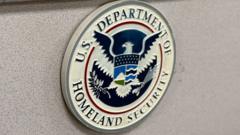The U.S. Department of Homeland Security has stated that temporary protected status for approximately 14,600 Afghans and 7,900 Cameroonians will be revoked, leading to challenges and anxiety for those affected, particularly amidst ongoing political tensions and competition over asylum policies.
US Immigration Policy Shift: Protections for Afghans and Cameroonians to End

US Immigration Policy Shift: Protections for Afghans and Cameroonians to End
The Biden administration announces the termination of temporary protected status for thousands of Afghans and Cameroonians, igniting fears and uncertainty among affected migrants.
The U.S. Department of Homeland Security (DHS) has recently announced significant changes to immigration policy that will result in the termination of temporary protected status (TPS) for thousands of Afghans and Cameroonians. This decision comes on the heels of a statement by Secretary of Homeland Security Kristi Noem, asserting that conditions in both countries no longer warrant such protections.
The announcement means that around 14,600 Afghans currently under TPS will lose their status in May, while approximately 7,900 Cameroonians will see theirs revoked in June. This marks a concerning shift as TPS is customarily granted to nationals from countries experiencing armed conflict or environmental disasters, providing them with protection from deportation and access to work permits.
Tricia McLaughlin, assistant secretary at DHS, explained that Secretary Noem's decision was influenced by the assessment from the United States Citizenship and Immigration Services (USCIS) regarding the evolving situation in Afghanistan, which has been under Taliban control for nearly four years. McLaughlin noted that the previous administration under Secretary Alejandro Mayorkas had extended TPS for Afghans only months before the current revocation.
This policy shift coincides with several other actions by the Trump administration that are raising alarms among migrant communities. Reports have surfaced about the administration moving to revoke the temporary legal status of more than 500,000 individuals from countries including Cuba, Haiti, Nicaragua, and Venezuela. These changes further complicate the status of numerous individuals who arrived in the U.S. through a process set up under the Biden administration, known as CHNV.
The human toll of these decisions is evident. Shukriah, a pregnant Afghan journalist residing in Washington DC, shared her harrowing experience as her family navigates the anxiety of potential deportation. Shukriah's mental health has deteriorated under the threat of removal, and she expressed uncertainty about her and her family's future as they await updates on their immigration status.
The broader implications of U.S. immigration policy, particularly the focus on mass deportations championed by Trump, reflect a changing landscape for asylum seekers and those relying on humanitarian protections. Last month, the U.S. deported approximately 37,660 individuals, a lower number than the average under the previous administration, signaling a shift away from the more lenient measures that had previously defined U.S. immigration policy.
As these changes unfold, advocates for affected groups are urging policymakers to reconsider these decisions and review the specific needs and conditions facing vulnerable populations seeking refuge in the United States. The urgency for a more humane immigration policy has never been clearer as numerous families are left grappling with uncertainty amid this transformative moment in U.S. immigration history.




















